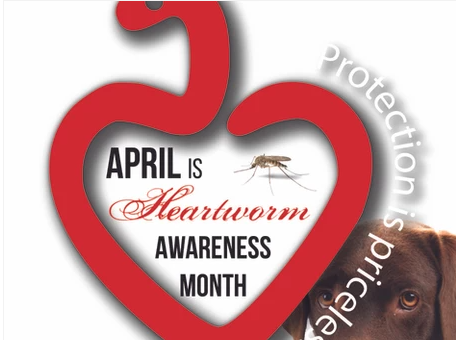Most dog owners are familiar with the threat of heartworm in the U.S. and give their pooches a monthly preventative “heartworm treat” to keep them from getting heartworm disease. Do you understand where heartworm comes from or the symptoms to look for if your dog is infected? During National Heartworm Awareness Month this month, take the opportunity to learn more about heartworm and what symptoms to look for in your dog if he or she is infected.
According to the American Heartworm Society, heartworm disease is a serious and potentially fatal disease caused by foot-long worms that live in the heart, lungs and associated blood vessels of affected pets. Heart worm disease can cause severe lung disease, heart failure and damage to other organs in the animal’s bodies. While cats and ferrets are also susceptible to heartworm disease, the disease is most common and most serious in dogs.
Dogs are natural hosts for heartworms, where the worms grow and mature inside the dog, mate and produce offspring. Untreated dogs have been known to host several hundred worms in their bodies, causing irreversible damage to their heart, lungs and arteries. Because of this, prevention of the disease is important!
How can my dog get heartworm?
Heartworm disease is transmitted from one pet to another through mosquitos. When a mosquito drinks the blood of an infected dog, fox, coyote or wolf, it picks up microscopic baby worms that circulate through the bloodstream. The disease develops and matures into “infective stage” larvae within the mosquito over a period of 10 to 14 days. Then, when the mosquito bites the healthy dog, the infective larvae are deposited onto the surface of the animal’s skin and enter the new host through the mosquito’s bite wound.
What are the symptoms of heartworm infection?
According to the American Kennel Club, there are four classes of infection, increasing in severity as the disease progresses:
- Class one: No symptoms or just a mild cough.
- Class two: Mild exercise intolerance and persistent cough.
- Class three: Greater exercise intolerance, abnormal lung sounds, weak pulse, syncope (fainting caused by impaired blood flow to the brain), decreased appetite, weight loss, ascites (swollen belly due to heart failure).
- Class four: Caval syndrome, a life-threatening cardiovascular collapse, which is marked by labored breathing, pale gums and dark coffee-colored urine, leading to complete organ failure and death.
Heartworm prevention is easy, and relatively inexpensive compared to the price heartworm pays on your dog’s health and the cost of the procedures to combat the disease. Preventatives should be taken monthly, and require a vet’s prescription. Preventative medication works inside your dogs body to kill off larval heart worms that may have made it into your dog’s body during the past month. Heartworm preventatives will not kill adult heartworms that are already present, so skipping a month or two may be detrimental to your dog’s health!
To learn more or to purchase April’s heartworm preventative contact your Animal Health Center today!



